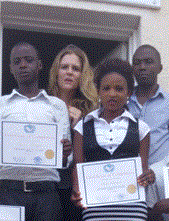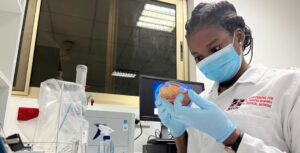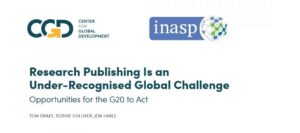INASP-funded workshop builds skills for Batwa graduate students
Guest post by Richard Ntakirutimana, Executive Director of the African Initiative for Mankind and Progress Organization (AIMPO).
 On 6-7 February 2016, with a grant provided by INASP, we conducted a training workshop entitled ‘Project Design, Research Methodology and Capacity-Building Skills for Batwa Graduate Students’.
On 6-7 February 2016, with a grant provided by INASP, we conducted a training workshop entitled ‘Project Design, Research Methodology and Capacity-Building Skills for Batwa Graduate Students’.
The organization that I lead represents the Batwa, also known as indigenous, forest peoples or Pygmy, who are the most marginalized and disadvantaged minority in Rwanda. The Batwa people were historically hunter gatherers in the forest of Virunga National parks but they were evicted from the forest due to the interest of creating National parks. The population of Batwa is only 25,000, which is 0.2% out of population of 13 million in the country. Being such a minority means that the Batwa face particular issues of poverty. At the moment in Rwanda, there are only 40 graduate Batwa students in the whole country and so our workshop focused on supporting these Batwa graduates.
The primary goal of the workshop was to equip participants with basic skills to design and plan a research project and gather data. Additionally, the training emphasized the importance of community engagement and consultation among the participants. It was amazing to see Batwa graduate students engaging in skill-building exercises and activities designed to assist them in the development of their communities. About 24 students participated in the workshop, the majority of whom were undergraduate students or recent graduates of different universities in Rwanda.
I assisted the main trainer, Ms. Meghan Laws, PhD Candidate at Queen’s University in Kingston Ontario to run the workshop. On the first day of the workshop, students examined the essential characteristics of successful projects, steps in project planning, and tools to engage our communities and gather information, including focus groups, and surveys. The second day examined interviews and gender matrixes. Again, interactive activities were used throughout the session. For example, when addressing interviews, students were asked to partner with another student to produce a short interview guide designed to address an issue of high importance within their communities.
We also addressed the differences between visions, goals, and objectives, as well as strategies for achieving objectives. We then proceeded to discuss the assignment of roles and responsibilities. Students produced ‘design templates’ within their existing group based on the ‘issue of high importance’ they had previously identified. The results of this exercise were presented to the large group. We held a third session one week later to administer an examination to participants. The exam consisted of two parts: a written examination and an oral examination in which students were asked to design and present a project. We encouraged participants to design a project that would address the most pressing needs of their community.
The diversity of topics that were presented, and level of competence in producing a refined proposal is a clear indication of how valuable the workshop has been to our community. We produced a list of exam results, and intend to use these results to recruit AIMPO staff for implementation of funded projects. From the bottom of my heart, I want to express my gratitude to AuthorAID and the INASP for providing us with the support and resources to implement our workshop.




